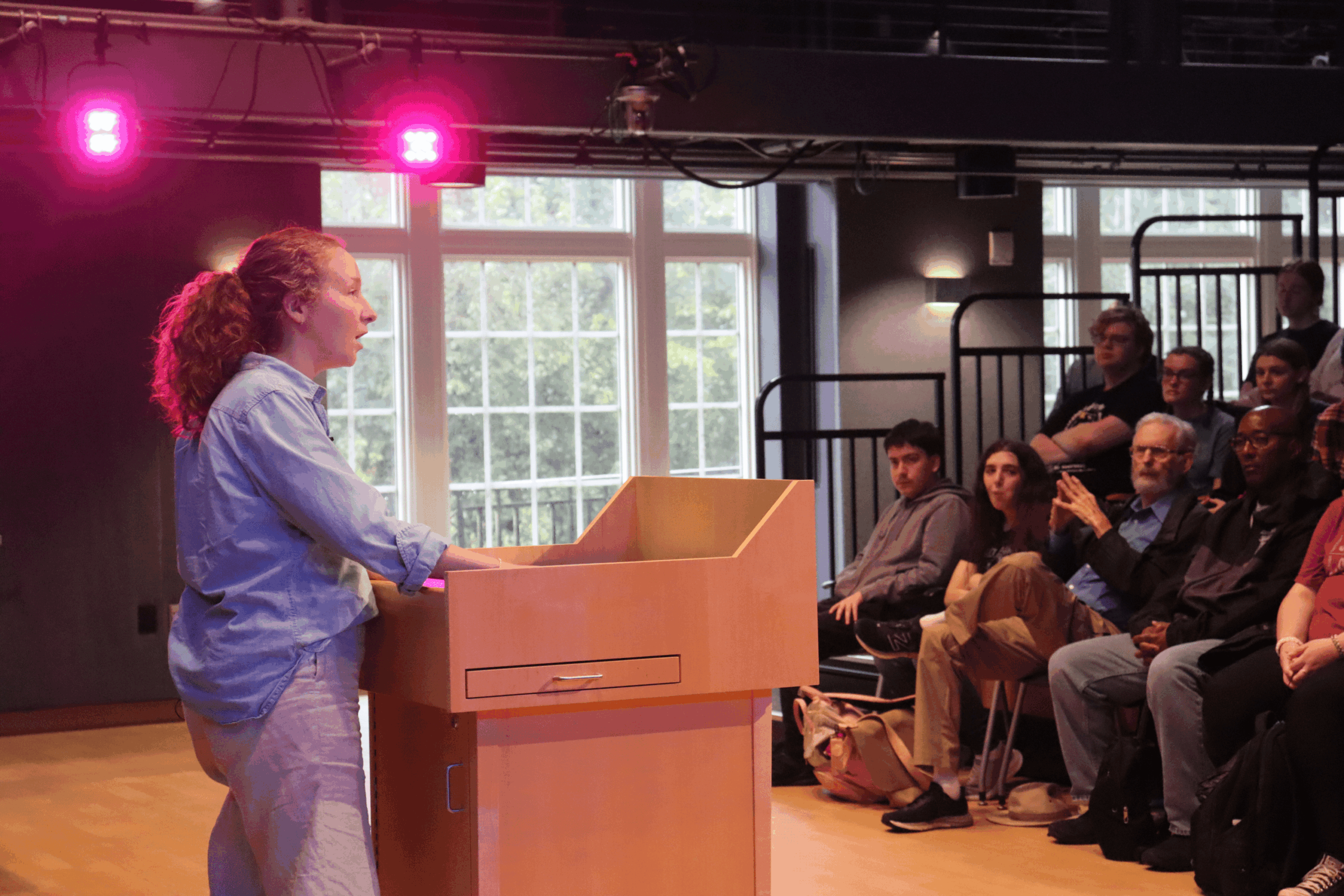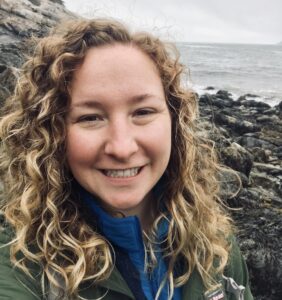Visiting Assistant Professor of Communication and Digital Studies
Education
- Ph.D., Communication, University of Pittsburgh
- M.A., Communication, University of Wyoming
- B.A., Communication Studies, James Madison University
Biography
Kaitlyn Haynal is a Visiting Assistant Professor in the Communication and Digital Studies Department at the University of Mary Washington. Her research explores how rhetoric informs ethical and inclusive world-making. She specializes in the digital humanities, environmental communication, and rhetorical criticism. Her work has been published in a variety of peer-reviewed journals and presented at disciplinary and interdisciplinary local, national, and international conference venues. A few projects she is current working on include studying uses of virtual reality to support oral communication practice, rhetoric of tipping points in climate change discourse, and rhetorical museology at the Siamese Twins Museum.
Dr. Haynal teaches a variety of introductory and advanced classes in Communication and Digital Studies and is a Safe Zone Program certified faculty member. Students can expect her classes to combine critical questioning and discussion with opportunities for hands-on creative practice. She is always looking for opportunities to get students out of the classroom and connecting with their institutional resources and local environments and communities.
Peer-reviewed journal articles
Allen, S., Batista, B. F., Zhang, L., & Haynal, K. (2025). “Another arrow in the quiver”: Student perceptions of integrating virtual reality into the public speaking course. Communication Education, 1–25. https://doi.org/10.1080/03634523.2024.2430778
McGreavy, B., Haynal, K., Smith-Mayo, J., Reilly-Moman, J., Kinnison, M. T., Ranco, D., & Leslie, H. M. (2022). How does strategic communication shape transdisciplinary collaboration? A focus on definitions, audience, expertise, and ethical praxis. Frontiers in Communication, 7. https://doi.org/10.3389/fcomm.2022.831727
Hartelius, E. J., & Haynal, K. E. (2021). The politics of a Memory Wound: Norwegian exceptionalism and the trauma of July 22, 2011. American Behavioral Scientist, 65(13), 1787-1804. https://doi.org/10.1177/00027642211003131
McGreavy, B., Kelley, S., Ludden, J., Card, D., Cogbill-Seiders, E., Derk, I., Gordon, C., Haynal, K., Krzus-Shaw, K., Parks, M.M., Petts, A., Ross, D. G., & Walker, K. (2020). “No (t) camping”: Engaging intersections of housing, transportation, and environmental justice through critical praxis. Review of Communication, 20(2), 119-127. https://doi.org/10.1080/15358593.2020.1737191
Allen, K. H. (2019). Blurred borderlands: Sustainability and the urban/nature divide at the Frick Environmental Center. Environmental Communication, 13(8), 1009-1023. https://doi.org/10.1080/17524032.2018.1553203
Haynal, K. (2016). The transformative power of communication: Democratizing practices for the general education classroom. The Journal of General Education, 65(2), 110-125. https://doi.org/10.5325/jgeneeduc.65.2.0110
Book Chapter
Haynal, K. (2021). Planning for change: The rhetorical (re)invention of urban parks. In E.D. McClellan, Y. Shin, & C. Chandler (Eds.), Urban communication reader IV: Cities as communicative change agents (pp. 15-26). Peter Lang Publishing.
“‘Another Arrow in the Quiver:’ Uses, Limitations, and Best Practices for Integrating Virtual Reality (VR) into the Basic Course.” Co-presented on the top paper panel of the Basic Course Division at the 110th annual convention of the National Communication Association in New Orleans, LA. (November, 2024)
“Scale-Making and the Rhetoric of Climate Crisis as ‘Tipping Point.’” Presented in the Rhetoric and Communication Theory Division of the 109th annual convention of the National Communication Association in National Harbor, D.C.. (November, 2023)
“A Rhetoric of Ethics: Engaging Collaboration through a Practice of Continuous Questioning.” Presented at the 17th biennial Conference on Communication and the Environment in Harrisonburg, VA. (June 2023)
“Coastal Futures: The Rhetoric of Vision Statements in Transdisciplinary Science Collaboration.” Presented at the 20th biennial convention of the Rhetoric Society of America in Baltimore, MD. (May 2022)
“Rhetorics for All.” Discussion panel at the 20th biennial convention of the Rhetoric Society of America in Baltimore, MD. (May 2022)
“An Engaged and Ethnographic Approach to Transdisciplinary Collaboration.” Presented at the Maine Sustainability and Water Conference in Augusta, ME. (March 2022)
“Communication and Team Science for Maine-eDNA.” Co-presented at the Maine Sustainability and Water Conference in Orono, ME. (April 2021)
“Orderly Citizens: Rhetoric of Urban Planning and Recreation in the Reform Park.” Presented on the top paper panel in the American Studies Division at the virtual 105th annual convention of the National Communication Association. (November 2020)
DGST 101: Introduction to Digital Studies
Introduces an interdisciplinary approach to using technology and specifically provides a foundation for the Digital Studies Minor. Coursework may include digital approaches to creativity, historiography, media analysis and thinking critically about and through digital culture.
COMM 205: Public Speaking
Study of the basic principles of public address. Emphasis is on developing a theoretical and practical understanding of oral communication through practice in preparing, delivering, and criticizing speeches in class.
COMM 206: Small Group Communication
Study of the theories and principles of effective communication and decision making in small group contexts. Emphasis is on understanding communication capabilities as a participant in and leader of small groups.
COMM 209: Argumentation
Study of the use of reasoning in persuasive communication with emphasis on the construction, evaluation, presentation, refutation, and defense of oral arguments.
COMM 370AA: Environmental Communication
How does communication contribute to more just world-making? In this course, we will examine communication by a range of environmental stakeholders, including industry spokespersons, government officials, NGOs, scientists, Indigenous groups, journalists, researchers, and interested citizens, to better understand how “the environment” is described, defined, negotiated, silenced, and transformed across complex spatial and temporal scales. Opportunities for engaged field research, multi-media learning, and active knowledge collaboration help illustrate some of the many ways the environment intersects with politics, culture, economics, technology, society, and more.

